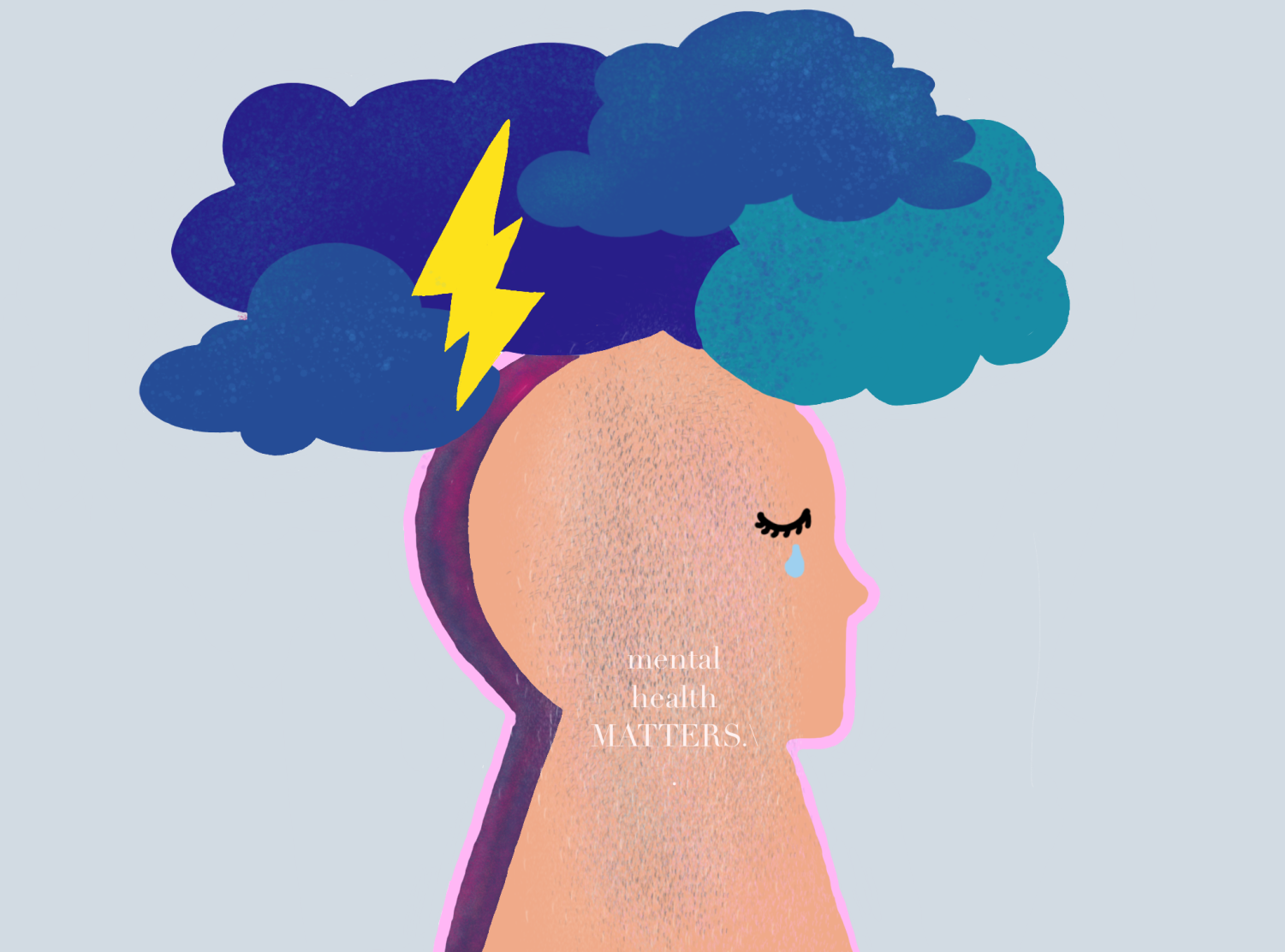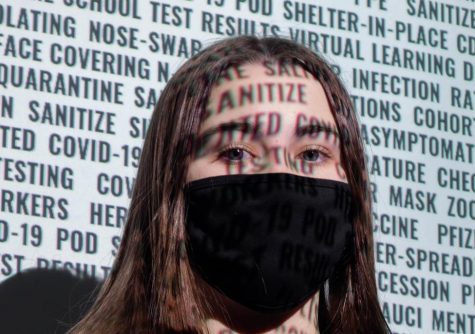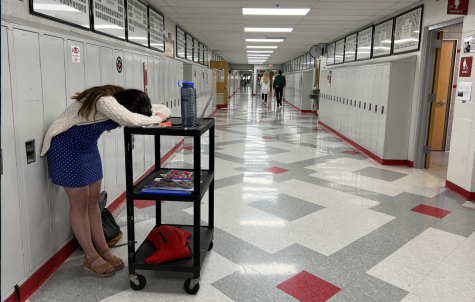COVID-19 Leads to Increased Mental Health Challenges for Students and Staff
COVID-19 is unprecedented, lockdown was unprecedented, and looking ahead to dealing with its mental and emotional effects is, you guessed it, unprecedented. Since the COVID pandemic, students have faced an onslaught of mental health challenges, namely anxiety and depression..
BSM’s guidance counselors have noticed a sharp increase in student anxiety. Every year since COVID, more students have come into their offices in tears, trying to skip tests. “I think some students when coming back to school full time are having a really hard time coping with anxiety, getting back into doing hard and scary things. Then we also saw so many students who are dealing with depression from all the negative things that are in the world,” counselor Amanda Anderson said.
Junior Demetra Walsma is one example of a student who’s still affected by mental health issues that were worsened by the isolation of the pandemic. She’s dealt with anxiety and depression since elementary school, but was formally diagnosed after lockdown. Walsma missed a lot of school in the past year due to depressive episodes, and she found it difficult to try and explain how it affected her to people who didn’t really understand. Her episodes have affected some of her relationships with friends, but she’s had a good support system in her family. This year, things are going better for her.
“I’m on medication. So I mean, I’m doing a lot better. I have a better support system…My parents are…very understanding about it…I have accommodations. Of course, I still fear that I’m going to go back in that depressive episode but I mean, overall, this year has been really great. So if something happens, it happens and I know how to deal with it,” Walsma said.
Walsma isn’t alone. The pandemic worsened pre-existing mental health problems and created new ones, and many people are still dealing with the fallout. In a Knight Errant survey, 63.5% of students and faculty at BSM reported that the pandemic negatively affected their mental health. Of these people, 33.3% say that pandemic-related mental health changes still affect them today. An additional 30.2% of respondents say that they are ‘kind of’ affected by these changes. These mental health changes continue to affect students and faculty in many aspects of their lives, from lost social skills, worsened academic performance, and lost milestones. This trend is consistent nationally; the CDC reports average anxiety severity scores increased 13% from August to December 2020.
Last year, masks, dress code, and testing accommodations were flexible and teachers were lenient. For some, leniency has led to anxiety. “When we were home we all had this motto of ‘do what you think you can do.’ Just do your best. Just survive it right? Now we’re all back to normal and we forgot how to multitask. We forgot how to have relationships. We forgot how to do everything. And so then every little thing is anxiety provoking,” counselor Amy Larson said.
In addition to academic anxiety, the pandemic also gave rise to social anxiety. For junior Sadie Storie, the pandemic caused her to become less extroverted. During lockdown, she spent a lot of time on social media, and the uncertainty surrounding the end of the pandemic negatively affected her mental health. When she returned to school in person, she had a hard time getting to know people and eventually lost a few friendships. It’s still hard for Storie to make connections with new people.
I think some students when coming back to school full time are having a really hard time coping with anxiety,
— Amanda Anderson
“But now, when I want to say something to someone, I just overthink it. And I’m unable to like, say something. And…because of that it’s been really hard to make friends and like connections with people,” Storie said.
Storie’s academic habits changed as a result of the pandemic, too. She had a lot of free time during the pandemic, and she went from prioritizing her homework to procrastinating. “My studying skills have definitely really gone downhill since. And I’m working on getting them back up, but it’s definitely hard…And that’s just like, it’s a process, like getting it all back,” Storie said.
Teachers have also seen the classroom struggle firsthand. “One thing that has stayed [a problem] is preparation for traditional tests and quizzes…because we went away from those for good, almost two years,” theology teacher Michael Becker said.
Becker has also experienced the effects of the pandemic on his mental health. During the pandemic, he experienced spikes in anxiety as case rates rose, and the loneliness and uncertainty of lockdown only made it worse. Going back to in-person teaching and coaching was incredibly difficult for him. After a year, though, Becker’s anxiety has gone down. He’s had mental health treatment, and he’s found support in his relationships with family, friends, and the community. His mental health has mostly gone back to normal. “ I felt supported in…having a strong community, with your family, with your friends, and also bringing the faith aspect into it too,” Becker said.
With mental health issues being more apparent after COVID and the anxiety that comes with school, self-care is more important now than ever before. “I do feel like COVID has taught us that we have to be more intentional about how we’re taking care of ourselves,” counselor Kate Berry said.
Response to Uptick in Mental Health Issues Among Providers
Because of the increase in mental health struggles since the pandemic, care providers have had to adapt to higher demand for services as well as at times, change their approach.
Dr. Jeff Steffenson is a clinical psychologist who both works at BSM and runs his own private practice. He thinks that the pandemic might have caused a loss of social skills, negatively affecting students’ relationships with others. The other major area that continues to be affected by the pandemic is, according to Steffenson, academics.
“I think there [were] two years of some missing stuff going on because a lot of the classes were teleclasses…I think that affects kids too because they’re frustrated sometimes especially with classes like math and things where they feel like they’re behind and I think that that can negatively affect mental health too,” Steffenson said.
For Dr. Sonja Benson, a psychologist practicing marriage and family therapy in Plymouth, the pandemic is in an in-between stage, where people are dealing with pandemic-related stressors even as they see the pandemic as “over.” In “They’re still trying to come back to what they might call a more normal place, and they haven’t. So we’re in this weird in-between, where the pandemic is kind of over, but we’re still having to fight our way back to normal,” Benson said.
As more people turn to mental health care to try and deal with stressors that may have been worsened by the pandemic, Benson sees the demand for therapy overwhelming the number of providers. “…I suspect the issue in not having enough available people was we probably didn’t have a huge surplus, or we might not have had enough in certain places in the first place. And then the increased demand has made it really very, very hard to find somebody that’s got an opening,” Benson said.
They’re still trying to come back to what they might call a more normal place, and they haven’t. So we’re in this weird in-between, where the pandemic is kind of over, but we’re still having to fight our way back to normal,
— Dr. Sonja Benson
On top of affecting providers, COVID has also impacted the methods they use to practice. One of the biggest mental healthcare-related changes is the increased use of telehealth. Before the pandemic, telehealth (or seeing patients online, as opposed to face-to-face) was rare. Now, telehealth is common. In conjunction with increasing telehealth usage, COVID also sped up expansion of PSYPACT. According to the American Psychological Association, PSYPACT is a multi-state agreement to let licensed psychologists practice across state lines in participating states. Both of these things have opened up new opportunities for psychologists, Steffenson included.
“And I have…[patients] in college in Colorado, Arizona, Massachusetts…It’s because of…the fact that tele psychology became a thing. So it’s always been there. But it became huge because of the pandemic. And it was a way to survive as a therapist, but also to be there for people who are really struggling related to it,” Steffenson said.
To adapt to telehealth, a lot of psychologists are getting creative in modifying their therapy strategies. Certain techniques, like EMDR (or Eye Movement Desensitization Reprocessing, which is commonly used as a trauma treatment), were previously only used in face-to-face sessions because of how they work.
“People have gotten creative about trying to adapt certain modalities that we always believed had to be in person to being able to do them…One of the things that I know that people are doing and I would have not ever believed it was going to work is EMDR. So they’re finding ways to do EMDR from virtual. And it sounds like there are people that are having good success with that, which is pretty amazing,” Benson said.




